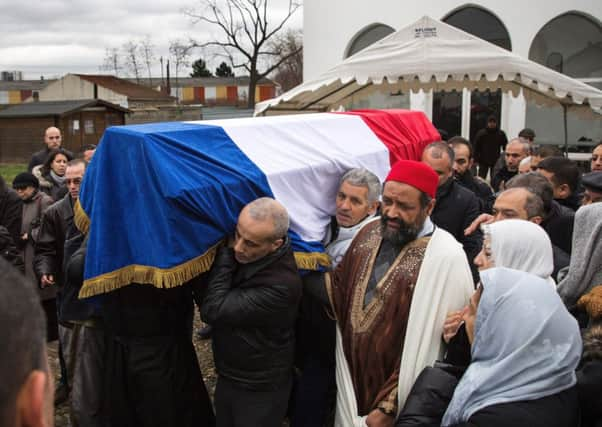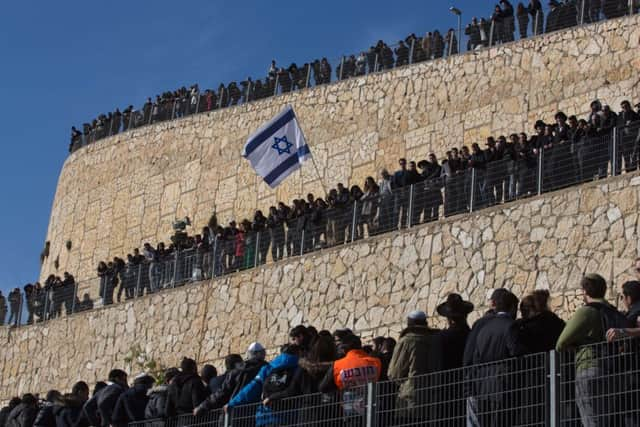France and Jerusalem mourn Paris terror victims


As funerals took place in the two cities for some of those killed, French president François Hollande told Parisiennes: “They died so that we can live free.”
Mr Hollande saluted the “courage, the bravery, the dignity” of three police officers killed on Wednesday and Thursday – Franck Brinsolaro, Ahmed Merabet and Clarissa Jean-Philippe – posthumously bestowing on them France’s highest decoration, the Légion d’Honneur.
Advertisement
Hide AdAdvertisement
Hide AdThe other dead included Yoav Hattab, Philippe Braham, Yohan Cohen and François-Michel Saada – four hostages killed in a kosher supermarket in Paris and remembered at funerals in Israel.


CONNECT WITH THE SCOTSMAN
• Subscribe to our daily newsletter (requires registration) and get the latest news, sport and business headlines delivered to your inbox every morning
Israeli prime minister Benjamin Netanyahu was among thousands at the ceremonies in Jerusalem. He said the victims’ lives had been “cut down by hatred”.
Seventeen people were killed in the spree launched by fundamentalist brothers Said and Cherif Kouachi and their accomplice Amedy Coulibaly.
The attacks began on Wednesday when hooded gunmen stormed the headquarters of satirical magazine Charlie Hebdo during its mid-morning editorial conference, killing 12 people including two police officers who had rushed to help.
Meanwhile, Bulgarian authorities confirmed yesterday they had arrested Fritz-Joly Joachin, a 29-year-old French national said to have links to Cherif Kouachi.
Tensions surrounding the magazine also escalated after a radical cleric condemned Charlie Hebdo’s decision to publish a cartoon of the Prophet Muhammad as an “act of war”.
Many Muslims consider it deeply offensive to depict Muhammad in any way – even if not intended to mock.
Advertisement
Hide AdAdvertisement
Hide AdThe front cover of the latest edition of Charlie Hebdo, the first since the attack on its Paris offices, shows the prophet crying and holding up a sign which states: “Je suis Charlie.” A headline above reads: “Tout est pardonne [All is forgiven].”
One of the surviving members of the magazine’s team said the cover should help “open the door to forgiveness” for those who killed her colleagues, stressing that “we cannot feel any hate towards them”.
Charlie Hebdo normally sells around 60,000 copies but this week about three million will be printed. It will also be translated into English, Spanish and Arabic, with distributors expected to order thousands of copies for shops across Britain.
At a press conference yesterday, cartoonist Renald Luzier – known as Luz – who came up with the idea for the cover, said: “It’s not the front-page the world wanted. It’s not the front page a terrorist would have wanted – there are no terrorists on there. There’s just a guy who’s crying.
“This Muhammad is so much nicer than the ones the terrorists brandish. He’s sympathetic. Look at him, he’s crying.”
Asked if he was concerned about the reaction, he added: “I’m not at all worried about the new cover. We are placing our trust in people’s intelligence, in humour, in irony.”
Even so, the editorial decision has starkly divided opinion, with radical Islamist preacher Anjem Choudary warning that if the “act of war” was tried in a sharia court, it would carry a sentence of capital punishment.
The lecturer in sharia law, who was arrested in September as part of an investigation into Islamist terrorism, accused the magazine of “blatant provocation”.
Advertisement
Hide AdAdvertisement
Hide AdAsked if he thought there would be repercussions, he replied, “Definitely,” before adding: “These things always have a history of coming back and biting them. People are not going to forget. And I’m sure there’s someone somewhere who will take the law into his own hands. It’s inevitable.”
The cartoon of the prophet also drew the ire of a leading Egyptian Islamic authority. Dar al-Ifta, in charge of issuing religious edicts, said it represented an “unjustified provocation” to millions of Muslims.
However, the Islamic Society of Britain appealed for calm, saying that although Muslims were entitled to be upset by it, they should be “far more offended” by issues such as injustice and economic exploitation.
Sughra Ahmed, the society’s president, said freedom needed to be defended “at all costs”. “We need to de-escalate the tension around all this,” she said. “We are not defending the new cartoon per se, but the ‘All is forgiven’ sentiment is important and gracious and if many of my work colleagues were shot dead last week, I would feel defiant and want to fight back, so I understand where this is coming from.”
Downing Street acknowledged that the publication of the cartoon could cause offence, but a spokesman for Prime Minister David Cameron said: “What he wholeheartedly defends is the right of editors to make their own editorial decisions. That is at the heart of freedom of the press and freedom of expression.”
Deputy Prime Minister Nick Clegg defended the cover as part of an “ideological struggle” to maintain a free society. “I’m not sure I’m going to buy it but I would defend the right to publish a cover like that,” he said.
As the magazine hit the newsstands, focus also fell on its contents. One spread depicts murdered cartoonist Cabu mocking jihadists fighting in Syria.
It also features previously published work by dead cartoonists Wolinski, Charb, Tignous and Honoré, and texts by Bernard Maris and Elsa Cayat, also killed last Wednesday.
Advertisement
Hide AdAdvertisement
Hide AdThe final page of the 16-page edition features another drawing by Luz depicting Islamist terrorists arriving in heaven and asking: “Where are the 70 virgins?” They are told: “With team Charlie, losers.”
One of Charlie Hebdo’s journalists, Zineb El Rhazoui, who was on holiday at the time of the attack, asked to whom the front page headline was addressed, said: “It is to us because we feel we have to forgive what happened. We feel the need to forgive the two terrorists who killed our colleagues. We cannot feel any hate towards them.
“The struggle is not with them but with an ideology.”
SCOTSMAN TABLET AND IPHONE APPS